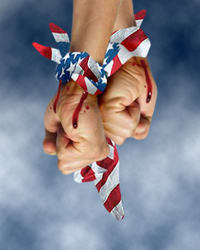The lawmakers who held oversight roles during the period included Pelosi and Rep. Jane Harman (D-Calif.) and Sens. Bob Graham (D-Fla.) and John D. Rockefeller IV (D-W.Va.), as well as Rep. Porter J. Goss (R-Fla.) and Sen. Pat Roberts (R-Kan).
Porter Goss says,
"Among those being briefed, there was a pretty full understanding of what the CIA was doing....And the reaction in the room was not just approval, but encouragement."
An Administration official says:
The attitude was, 'We don't care what you do to those guys as long as you get the information you need to protect the American people.' "
As to how these four were chosen,
U.S. law requires the CIA to inform Congress of covert activities and allows the briefings to be limited in certain highly sensitive cases to a "Gang of Eight," including the four top congressional leaders of both parties as well as the four senior intelligence committee members. In this case, most briefings about detainee programs were limited to the "Gang of Four," the top Republican and Democrat on the two committees. A few staff members were permitted to attend some of the briefings.
It wasn't until 2006 that the CIA briefed the full House and Senate Intelligence Committees on the enhanced interrogation program.
The CIA has now admitted using waterboarding on three detainees held in overseas prisons. The Post says one remains unidentifed and the other two are Khalid Sheik Mohammad and Zayn Abidin Muhammed Hussein Abu Zubaida. I assume Abu Zubaida is the person identified yesterday in the New York Times as Abu Zubaydah. (More analysis here.)
WaPo quotes Bob Graham as saying they were unaware of the use of waterboarding. As to Pelosi, who wouldn't comment directly,
[A] source said Pelosi recalls that techniques described by the CIA were still in the planning stage -- they had been designed and cleared with agency lawyers but not yet put in practice -- and acknowledged that Pelosi did not raise objections at the time.
Jane Harman says she did protest.
Harman, who replaced Pelosi as the committee's top Democrat in January 2003, disclosed Friday that she filed a classified letter to the CIA in February of that year as an official protest about the interrogation program. Harman said she had been prevented from publicly discussing the letter or the CIA's program because of strict rules of secrecy.
"When you serve on intelligence committee you sign a second oath -- one of secrecy," she said. "I was briefed, but the information was closely held to just the Gang of Four. I was not free to disclose anything."
Worth re-reading: Jane Mayer's New Yorker article, The Black Sites, which describes the torture of Khalid Sheikh Mohammed and others. She also mentions Majid Khan, whom I wrote about yesterday (his lawsuit is pending):
The utter isolation of these detainees has been described as essential to America’s national security. The Justice Department argued this point explicitly last November, in the case of a Baltimore-area resident named Majid Khan, who was held for more than three years by the C.I.A. Khan, the government said, had to be prohibited from access to a lawyer specifically because he might describe the “alternative interrogation methods” that the agency had used when questioning him. These methods amounted to a state secret, the government argued, and disclosure of them could “reasonably be expected to cause extremely grave damage.” (The case has not yet been decided.)





